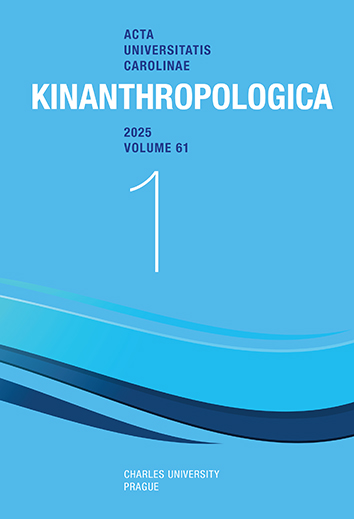Acta Universitatis Carolinae Kinanthropologica (AUC Kinanthropologica) is an international peer reviewed journal for the publication of research outcomes in the humanities, the social sciences and the natural sciences, as applied to kinathropology. It is a multidisciplinary journal accepting only original unpublished articles in English in the various sub-disciplines and related fields of kinanthropology, such as Anthropology, Anthropomotorics, Sports Pedagogy, Sociology of Sport, Philosophy of Sport, History of Sport, Physiology of Sport And Exercise, Physical Education, Applied Physical Education, Physiotherapy, Human Biomechanics, Psychology of Sport, Sports Training and Coaching, Sport Management, etc. The journal also welcomes interdisciplinary articles. The journal also includes reports of relevant activities and reviews of relevant publications.
The journal is abstracted and indexed by CNKI, DOAJ, EBSCO, ERIH PLUS, SPOLIT, SPORTDiscus, and Ulrichsweb.
AUC KINANTHROPOLOGICA, Vol 46 No 2 (2010), 66–73
Effect of Hydrotherapy, Active and Passive Recovery on Repeated Maximal Climbing Performance
Jiří Baláš, Patrik Chovan, Andrew J. Martin
zveřejněno: 04. 02. 2015
Abstract
Effect of Hydrotherapy, Active and Passive Recovery on Repeated Maximal Climbing Performance The aim of the study was to compare the effect of four recovery methods (PAS – passive, ACT – active, CW – cold water, CWW – cold and warm water) on repeated climbing performance. Five advanced climbers (mean age 28.6, s = 4.0 years) performed, in a random crossover design, 4 sessions with 3 repeated climbing tests to exhaustion. The effect of the recovery methods on climbing performance (number of movements, climbing time), heart rate and grip strength was assessed by 4 × 3 repeated-measure ANOVA (recovery method × climbing test number). Significant interaction between recovery and the climbing test number for climbing performance was found (number of climbing movements: F6,32 = 2.23; p = 0.07; η2 = 0.30; climbing time F6,32 = 2.90; p = 0.02; η2 = 0.35). The decrease of performance between the 1st and 3rd test was after PAS 41%, CWW 24%, CW 0% and ACT 14% of the number of climbing movements. The recovery method did not have any effect on grip strength. The average decrease in grip strength was 30% after climbing and was significantly correlated with the number of climbing movements (r = 0.80) and climbing time (r = 0.72). The results demonstrated that ACT recovery and CW immersion are two means to maintain subsequent climbing performance to exhaustion. Vliv hydroterapie, aktivního a pasivního zotavení na opakovaný lezecký výkon Cílem studie bylo posoudit vliv čtyř typů odpočinku (PAS – pasivní, ACT – aktivní, CW – studená voda, CWW – studená a teplá voda) na opakovaný lezecký výkon. Pět pokročilých lezců (průměrný věk 28.6, s = 4.0 let) podstoupilo podle náhodně křížového plánu čtyři měření s třemi opakovanými lezeckými testy do vyčerpání. Efektivita odpočinku na lezecký výkon (počet kroků, čas lezení), srdeční frekvenci a sílu stisku ruky byla posuzována 4 × 3 analýzou rozptylu s opakováním měření (typ zotavení × lezecký test). Byla shledána významná interakce mezi typem zotavení a lezeckým testem (počet kroků: F6,32 = 2,23; p = 0.07; η2 = 0,30; čas lezení F6,32 = 2,90; p = 0,02; η2 = 0,35). Pokles výkonu mezi prvním a třetím lezeckým testem byl po PAS 41 %, CWW 24 %, CW 0 % a ACT 14 % lezeckých kroků. Typ zotavení neměl vliv na sílu stisku ruky. Průměrný pokles síly stisku ruky po lezení byl 30 % a byl v těsném vztahu s počtem lezeckých kroků (r = 0,80) a časem lezení (r = 0,72). Výsledky ukázaly, že ACT odpočinek a ponoření do studené vody jsou vhodné prostředky k udržení opakovaného lezeckého výkonu do vyčerpání.
klíčová slova: hydrotherapy; recovery; sport climbing; climbing performance hydroterapie; odpočinek; sportovní lezení; sportovní výkon
157 x 230 mm
vychází: 2 x ročně
cena tištěného čísla: 190 Kč
ISSN: 1212-1428
E-ISSN: 2336-6052
